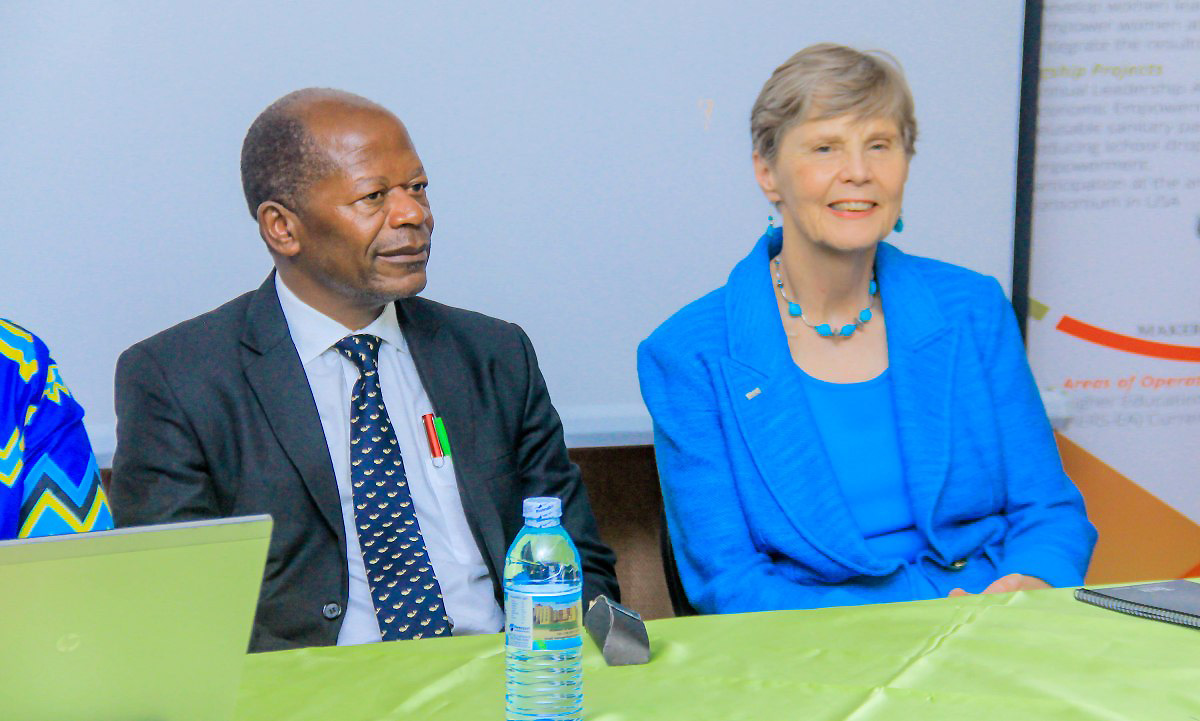The week-long Higher Education Resource Services-East Africa (HERS-EA) Third Academy closed on a high note on Friday, 5th July 2019 with the State Minister for Higher Education, Hon. Dr. John Chrysostom Muyingo urging graduates not to wait for the ball to come to them but to go for it instead. The State Minister noted that by empowering female leaders with skills in grant writing, gender- responsive budgeting, research and publishing and other areas, HERS-EA was moving in the right direction and preparing women to “go for the ball.”
Hon. Dr. Muyingo who conveyed the First Lady and Minister of Education and Sports Hon. Janet Kataaha Museveni’s love and full support for the Academy thanked the HERS-EA leadership and facilitators for sharing their knowledge and skills with the ladies.
“The Uganda Vision 2040 and Second National Development Plan prioritise gender- equitable development. The Ministry of Education and Sports (MoES) welcomes all partners and institutions that contribute to equitable development in Uganda. HERS-EA has focussed on discussing and identifying solutions to equitable Higher Education Institutions in East Africa and we thank you for that” remarked Hon. Dr. Muyingo.
The State Minister further shared that MoES has embarked on reviewing the Education and Sports Sector Strategic Plan and assured HERS-EA that the Government was looking forward to learning from their practices. “I invite you to support the Ministry of Education and Sports and make a contribution by influencing the Education and Sports Sector Strategic Plan review process.”
Hon. Dr. Muyingo concluded his remarks by urging the Graduates not to lament about challenges in their home institutions but implement all the best practices that they had learnt from the Academy instead. He paid tribute to the Academy funders and founders for their selfless contributions and to Makerere University for contributing to the empowerment of women.
“Use your age and expertise to influence what goes on in other institutions” said Hon. Dr. Muyingo, in address to the Makerere University leadership, represented by the Deputy Vice Chancellor (Academic Affairs), Dr. Umar Kakumba.
Moving a vote of thanks, Dr. Kakumba who represented the Vice Chancellor, Prof. Barnabas Nawangwe expressed gratitude to Hon. Dr. Muyingo for presiding over the closing ceremony, and affirmed Makerere University’s commitment to champion gender mainstreaming initiatives in the region.
“I want to reassure the Chief Guest and all participants that Makerere University through the Gender Mainstreaming Directorate (GMD) and in partnership with Higher Education Institutions in Uganda and regionally-initiated collaborations is committed to making policy and strengthening the implementation of gender mainstreaming in various aspects of teaching, learning, research and administration” said Dr. Kakumba.

He further reiterated the University’s readiness to support the Ministry of Education and Sports’ sector strategic plan review process, so as to empower women and address socio-cultural aspects that have impeded their development.
Delivering the concluding address to participants, HERS-EA Coordinator, Ms. Naomi Lumutenga quoting the biblical parable of talents urged the women to always use their skills and placements as platforms to influence their home institutions for the better. “I urge you to step out boldly and be the agent of change in your community or institution.”
She recognised Ugandan-born Mississippi State University-based Professor Margaret Khaitsa who conceptualised HERS-EA, then presented to the Chief Guest names of dignitaries that HERS-EA recognized for their initial and continued selfless contributions to the organisation’s success. These were;
- Prof. Barnabas Nawangwe, Vice Chancellor, Makerere University – for unlocking and expediting the establishment of HERS-EA while still serving as Deputy Vice Chancellor (Finance and Administration) and for his continued support the organisation’s objectives
- Dr. Pius Kamau, General Surgeon and President, Africa America Higher Education Partnerships, (AAHEP) – for making the initial connections for HERS-EA founders with women leaders in Kenya and Tanzania and personally sponsoring the inaugural convention, at the Sheraton Hotel, in October 2012.
- Prof. John David Kabasa, Principal, College of Veterinary Medicine, Animal Resources and Biosecurity (CoVAB) – for hosting the first HERS-EA Office and funding the two-day workshop at HERS-EA’s launch
- Prof. Judith White, Women's Equity Advocate, Retired Non-profit Leader and Former President and Executive Director of HERS – for being the HERS rock and moral campus and introducing HERS-EA Founders to Dr. Pius Kamau
- Dr. Ruth Muwazi, Chair HERS-EA and Former Deputy Principal CoVAB – for her diligent pro bono service to the organisation since its inception
Speaking on behalf of the Third Academy Graduates, Dr. Pamela Khanakwa from the Department of History, Archaeology, and Heritage Studies, Makerere University thanked the HERS-EA leadership and facilitators for helping her cohort understand the politics of male-dominated institutions and strategies on how to work with them. She also thanked the Academy for challenging participants to think beyond the present day.
“We have been challenged to think about where we want to be in the next five years, set targets and develop strategies on how to achieve them. We were taught how to develop career maps and paths and how to continue working even after retirement. We learnt how to discover what else we can do within our mainstream academic zones so as to prosper, thrive and stay relevant” added Dr. Khanakwa.
Participants in the HERS-EA Third Academy were drawn from hosts Makerere University, Kyambogo University, Mbarara University of Science and Technology (MUST), Muni University, Uganda Christian University (UCU), Clarke International University and Mekelle University Ethiopia. Notable among them was Dr. Elizabeth Kyazike, Dean, Faculty of Arts and Social Sciences, Kyambogo University and first female archaeologist to earn a PhD in Uganda.
Article by Public Relations Office
Related article
HERS-EA Third Academy Urges Women Leaders to Soar!

 General1 week ago
General1 week ago
 Natural Sciences1 week ago
Natural Sciences1 week ago
 Agriculture & Environment1 week ago
Agriculture & Environment1 week ago
 Health2 weeks ago
Health2 weeks ago
 Health1 week ago
Health1 week ago




